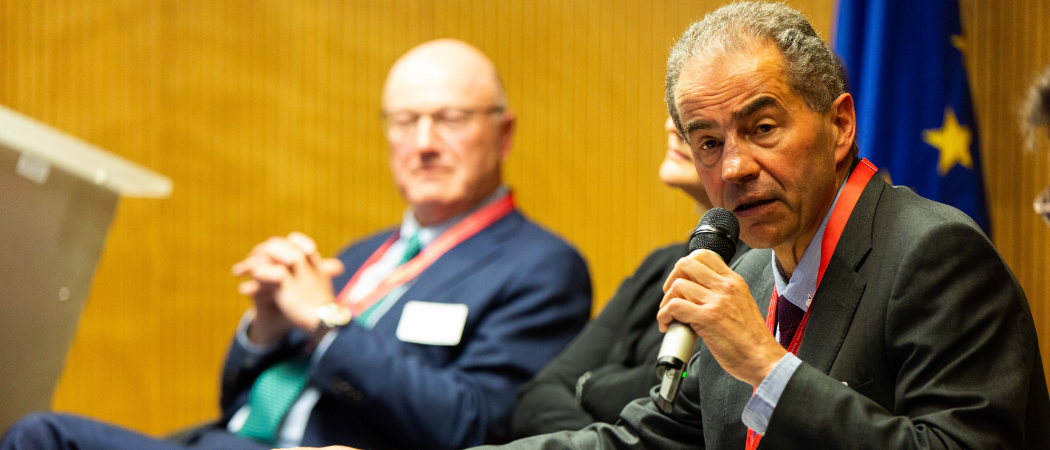Companies welcome Framework Programme 10 advisory group’s proposal for a new industrial competitiveness council to steer collaborative research

Portugal’s former science minister Manuel Heitor during the publication event of the High-Level Group report on the mid-term review of Horizon Europe on October 16, 2024, in Brussels, Belgium. Photo credits: Bogdan Hoyaux / European Union
The recommendation to set up a European Technology and Industrial Competitiveness Council (ETIC2) to steer collaboration in the next Framework Programme would lay the groundwork for a “transformative shift” in research and innovation funding that would make EU programmes more appealing to business, according to Ernst Lutz, president of the European Industrial Research Management Association.
ETIC2 is “a direct response to industry needs for greater autonomy and sector-specific support within the Framework Programme,” he told Science|Business. “Involving industry leaders in programme governance not only builds trust but ensures that funding priorities are aligned with private sector goals for innovation and growth.”
The recommendation to form ETIC2 was made by the Heitor group of experts advising the Commission on Horizon Europe and the next Framework Programme, FP10, and is based on its conclusion that a lack of industry investment in research and innovation is the “biggest challenge to European competitiveness”.
To address this, the group recommended enhancing industry involvement by setting up ETIC2. The council would be governed by experts, including CEOs or CTOs from industry, sitting on an modelled on the European Research Council’s Scientific Council. It would sit alongside a Societal Challenges Council for socially valuable research and innovation that does not have potential for industrial applications.
“There is a need to improve the strategic orientation of the Framework Programme to prioritise industrial competitiveness in what is currently pillar 2 of Horizon Europe, emphasising technology development, resilience and the green transition,” the expert group report says.
“While the basic structure emphasising collaborative projects and partnerships is good, there is a need to consider new ways of involving and committing industry for the smoothest path from idea to demonstration, upscaling and deployment.”
Mario Draghi’s report on EU competitiveness also pointed to a lack of private innovation, with EU companies spending half as much on R&I as a share of GDP as US firms, and mostly in mature sectors such as the automobile industry, rather than digital and high tech sectors.
Pillar 2, the EU’s main tool for stimulating private investment in Horizon Europe, includes dozens of public-private partnerships funding collaborative research.
“Due to inflexibility, fragmentation, the lack of focus on future technologies and the administrative burden placed on the partners, there is a risk of ‘industry walking away from the Framework Programme’ at a time when both industry and the framework programme need each other more than ever,” the report says.
Industry association DigitalEurope welcomed the report. It is “a positive move towards a more streamlined, impactful, and industry-inclusive framework for Europe’s industrial future,” a spokesperson said. The ETIC2 proposal is “a potential milestone in fostering a more inclusive co-creation process where the industry plays an active and essential role.”
“We strongly support the focus on discontinuing funding for initiatives that aren’t delivering results, in favour of scaling successful, industry-led initiatives.”
Radical simplification
The advisory group’s call for “radical simplification” of the Framework Programme also went down well with the private sector.
“Transitioning to a ‘trust first/evaluate later’ model would dramatically reduce time and resource burdens, opening the doors for a wider array of companies to participate,” said Lutz. “Simplifying application processes, eliminating overlapping instruments, and cutting down on administrative costs would make these programmes far more appealing to industry.”
Lutz, who is chief technology and innovation officer at Bekaert, a specialist in steel wire and coating technologies, also welcomed the recommendations for a more flexible approach to international cooperation, and for new public procurement initiatives which he calls “a clear win for industry”.
Similarly, the Digital Europe spokesperson said, “Reducing complexities in application processes, addressing human resources challenges, cutting down on administrative costs, and speeding up response times are all critical to enabling effective industry collaboration.”
Nicolas Creff, associate director at pharmaceutical industry lobby EFPIA, welcomed the report’s focus on supporting the whole spectrum of R&I, from early discovery to late-stage development and deployment of results.
"Europe needs more and not less collaboration between all stakeholders to align on imperatives and find solutions together,” he said.
Creff also believes simplification is crucial to increasing collaboration in the pharmaceutical industry, which is one of Europe’s most R&D-intensive sectors.
“The rules of EU programmes should reflect the operational reality of the industry. The recommendation to leverage industry in-kind contributions via a significant reduction of the administrative burden is therefore very relevant,” he told Science|Business.
Innovation continuum
Adam Piotrowski, president of the board at Polish company Vigo Photonics, who was among the industry representatives in the 15-strong Heitor advisory group, said industry is already investing a lot. “What we need is better cohesion, better synergy between industrial investment and public spending.”
He believes giving industry a voice in overseeing the various EU partnerships can support the adoption of innovative technologies. “As a result of previous Framework Programmes, we see a lot of technologies that were developed in Europe and then deployed to US or Asian companies,” he said.
At the other end of the R&I continuum, there should be more industry involvement in early-stage research. “We saw in reports from many different sources that fundamental research right now in US and China is also sponsored by corporations,” he said. Large European companies do invest in research in areas such as quantum, but not at the same rates.
ETIC2 could help by connecting different partnerships, for example providing links between enabling technologies such as microelectronics and quantum, and artificial intelligence and other industrial sectors.
Piotrowski says the council should incorporate a range of stakeholders from industry, academia, and government. “If we’re going to put in one room just a few large companies, it will end up nowhere,” he said.
“I imagine the start-up community should be there, but the research community should be there as well to better understand the needs of large industry and to implement more tools from fundamental research.”
Piotrowski believes there is “good alignment” between the group’s recommendations and the Commission’s goals. Winning the support of the member states could prove trickier. “That would be the crucial point of decision: how much this European competitiveness would be driven by Horizon Europe, and how much it would be driven by sovereign states.”





 A unique international forum for public research organisations and companies to connect their external engagement with strategic interests around their R&D system.
A unique international forum for public research organisations and companies to connect their external engagement with strategic interests around their R&D system.